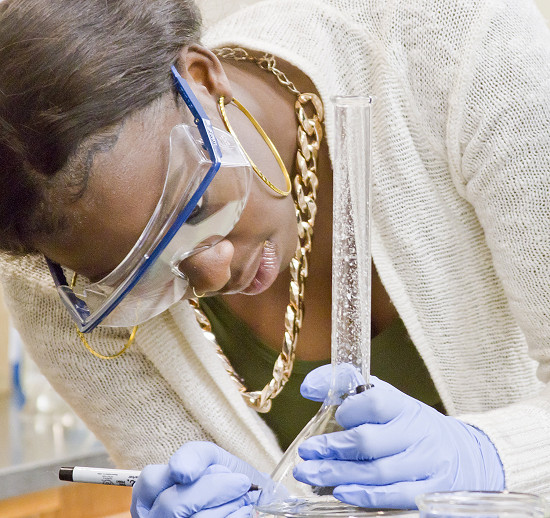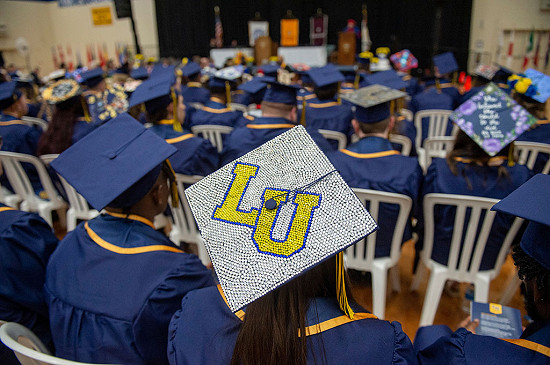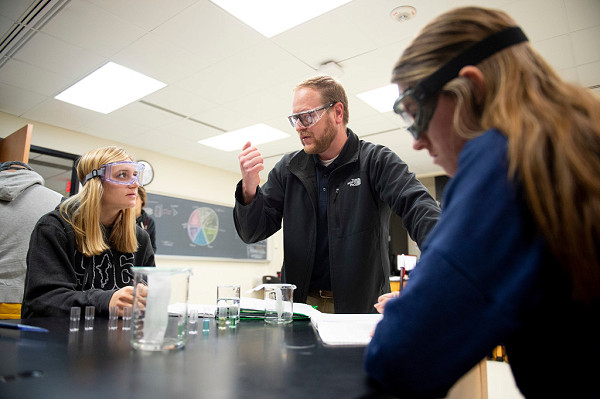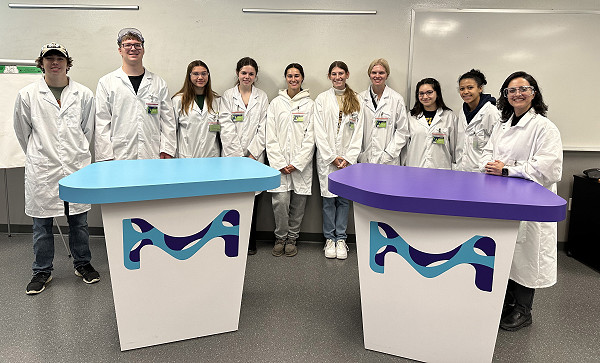Lakeland University chemistry and biochemistry students are sought after within the chemical and biochemical industries in the region because at Lakeland you will be involved, engaged and invested. You won’t sit in a large auditorium robotically taking notes while a professor lectures through a microphone. Our faculty gets to know our students personally and help connect them to our industry leaders through our innovative Cooperative Education program.
At Lakeland University, learning Chemistry means living Chemistry. Once you dive into our interactive program, you'll quickly realize that here, you are one of a kind — not one of many.
Our program offers hands-on experiences with state-of-the-art equipment found in most chemistry departments. The difference is that you will learn to design, run, and troubleshoot your experiment, not a teaching assistant. Our facilities will prepare you to be a leader in your graduate program or your place of employment after you graduate
Majoring in chemistry and biochemistry opens up numerous career doors. A degree from Lakeland will prepare you for medical school or pharmacy school because your courses will meet the prerequisites for professional school acceptance. In addition, we currently have multiple students working toward their Ph.D. in graduate schools around the state and country.
If you’d prefer to go directly into the workforce, there are plentiful Cooperative Education opportunities with local companies. Your Bachelor of Science in Chemistry & Biochemistry degree will make you an exceptionally attractive candidate for entry-level positions involving chemistry. Not only will you have an opportunity to get your foot in the door of national and multinational chemical companies, you can earn a much better wage than typical work study students in any college while you are in school!

Cooperative Education is all about hands-on learning outside the classroom. Students learn more by doing. They gain real-world knowledge and earn academic credit for hands-on professional work experience — and coursework is centered around these real-life experiences, situations and career goals.
Lakeland students explore their interests and, when they graduate, feel confident they will find a career in which they are passionate.
*Data provided by Job Center of Wisconsin's Occupational Employment & Wage Statistics for Chemists.
The Lakeland Undergraduate Research Experience (LURE) is our highly regarded 10-week summer research program. Working closely with a Lakeland faculty member, you’ll design your project, conduct all publishable research, troubleshoot, analyze data, and eventually present your findings at a state or national scientific conference.
Lakeland University has invested over $3.2 million into our Chase Science Center to feature high-tech equipment such as a DNA sequencer and a fluorescent microscope, among other state-of-the-art tools. Unlike other big universities, we not only allow you to work with our world-class equipment – we encourage it!

According to the National Community Pharmacists Association, 70% of pharmacies are experiencing staffing shortages, and the problem seems to be growing — that's why Lakeland University has partnered with Concordia University Wisconsin.
Students enrolled in our dual degree program and meet all requirements will finish with a bachelor of science degree with a major in chemistry & biochemistry-pharmaceutical emphasis from Lakeland University and a doctor of pharmacy degree from Concordia University Wisconsin School of Pharmacy. Students enrolled in the program will take their last year of Lakeland courses for their bachelor’s degree at Concordia while they are completing their first year of pharmacy school.

You already passed your first test, you are interested in applying to Lakeland and learning more about your opportunities to success! Click the button below to being the application process.
Once your application is received, your Lakeland University admissions counselor will be in touch.
*Exceptions to the above admission criteria may be granted for students with a cumulative GPA range from 1.75 to 1.99 if the academic experience that resulted in the less than 2.0 GPA was more than two years ago. Furthermore, typically students with a cumulative GPA range from 1.50 to 1.75 will only be considered if the poor academic performance experience that resulted in the less than 2.0 GPA was more than five years ago. Students receiving an exception will be admitted conditionally.

Program Director, Food Safety & Quality, Assistant Professor of Chemistry and Food Safety & Quality


